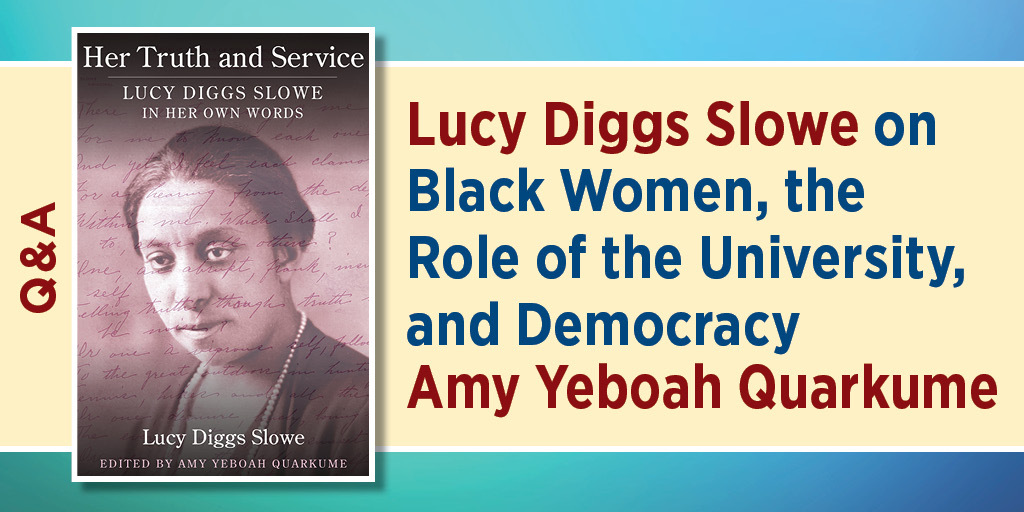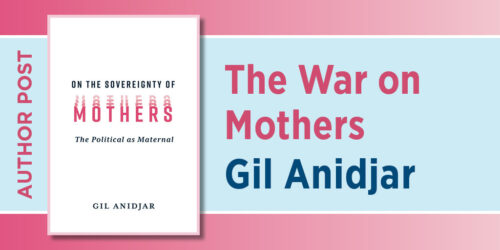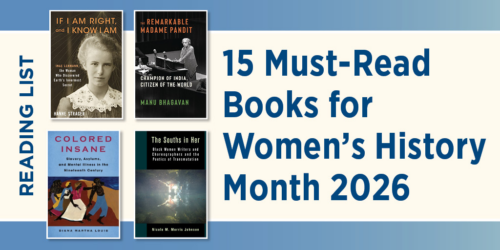Lucy Diggs Slowe on Black Women, the Role of the University, and Democracy
Amy Yeboah Quarkume

Lucy Diggs Slowe (1885–1937) was one of the most remarkable and accomplished figures in Black women’s higher education. Her story is one of resilience, activism, and relentless determination to overcome barriers. She defied societal limitations to become a pioneering educator and advocate for women’s rights, yet her name remains mostly unknown. In this Q&A, Amy Yeboah Quarkume, editor of Her Truth and Service: Lucy Diggs Slowe in Her Own Words, introduces us to Slowe’s legacy and links her story to the ongoing struggle for recognition faced by Black women throughout history.
Q: Who was Lucy Diggs Slowe?
Amy Yeboah Quarkume: Dean Lucy Diggs Slowe was a pioneering educator, women’s rights advocate, racial justice leader, award-winning athlete, and the first African American woman to serve as a dean at Howard University. Born in 1885, Slowe dedicated her life to breaking down barriers for Black women in education and beyond. She died at what I would say is a young age, from what I would say is sexism, racism, and classism.
Despite her significant contributions, many have not heard of her—sadly, the historical erasure of Black women’s accomplishments has been a pervasive issue. In the book, one can tell Slowe was very active publicly, working with U.S. presidents and other world-renowned figures and giving talks, lectures, and speech across the United States—yet, as I say in the book, a Black woman “can be everything for everybody and still not be valued.” Black women have historically struggled for recognition despite endless contributions to society, and Slowe’s life exemplifies that reality. While Slowe’s name may not be as widely recognized as it should be, her impact on education and civil rights continues to inspire future generations.
Q: Slowe was heavily involved in activism and organizing. Who were some of the key figures with whom she worked?
Yeboah Quarkume: It is well-documented in pictures and letters that Dean Lucy Diggs Slowe collaborated with notable figures such as W.E.B. Du Bois, Mary McLeod Bethune, Charlotte Hawkins Brown, Marian Anderson, E. Franklin Frazier, President Franklin D. Roosevelt, Eleanor Roosevelt, Mary Church Terrell, and numerous other prominent figures of her generation.
What remains elusive, despite Slowe’s decades of activism, is an audio recording of her voice. Through the project I’ve undertaken with Sonja Williams, a distinguished author, educator, and media producer at Howard University, we aim to give voice to some of Slowe’s most powerful speeches. These recordings will be released alongside the book, adding depth and dimension to our understanding of Slowe’s legacy.
Q: Slowe is noted in the text for making strong statements about democracy, politics, and race relations in America. As we head into the next presidential election, what can we learn from her words?
Yeboah Quarkume: In March 1933, Slowe made this profound statement: “In the last two weeks, America has transitioned from a representative form of government to a dictatorship.” On public radio in 1937, she boldly asserted that “the snobbery, the disdain which many of our white citizens show toward Negroes, regardless of their personal worth, is sowing seeds of destruction for both groups, unless eradicated before they come to fruition.”
A fervent advocate for change in America, Slowe’s skepticism toward the government didn’t hinder her from actively engaging with it to drive transformation. She faithfully championed the necessity of Black women’s active involvement in both domestic and international politics, even amidst systemic marginalization. With a profound understanding of America’s social and political landscape, Slowe remained steadfast in her commitment to speaking out, taking action, and occasionally challenging the status quo. Her enduring legacy stands as a testament to the resilience and determination inherent in activism for justice and equality.
When I look for signs of Slowe’s legacy in present-day politics, I remember that Vice President Kamala Harris is a member of the organization Slowe cofounded, Alpha Kappa Alpha Sorority Incorporated, and a political science graduate from Howard University. While we may not witness the exact change Slowe envisioned in America, we can see the enduring influence of her example, inspiring Black women to persistently engage and make their voices heard, continuing the legacy of showing up and advocating for progress.
Q: As a Black woman working at an HBCU, what do you feel was Slowe’s biggest challenge?
Yeboah Quarkume: We hold our HBCUs in high regard, and so did Slowe. She often credited her success to her high school in Baltimore and to Howard University. Slowe’s love for Howard University was profound. She not only graduated from the institution but also served diligently as an alumna before returning to become its first dean of women.
However, despite her deep affection for the university, it became a source of immense struggle for her. Slowe’s greatest challenge lay in discerning when to step back. Growing up with considerable pain, having lost both parents at a young age, I think she developed a tendency to numb herself as a coping mechanism. After waiting for years for a simple promotion, she perhaps should have recognized the need to cease working rather than continuing without the necessary resources to fulfill her duties. Instead of taking a much-needed rest, she often found herself traveling to deliver speeches about Howard women and their achievements. This unwavering commitment to showing up took a toll on her health. In hindsight, her dedication, while admirable, came at a cost, highlighting the delicate balance between persistence and self-care.
Q: In her letters, Slowe discusses the role of a university. What do you think she would say about what recently unfolded at Harvard University?
Yeboah Quarkume: In 1931, Slowe penned a poignant response to the dean of women at Syracuse University, who had been questioning whether Black girls should be integrated into the regular dormitories alongside other students or segregated. Slowe eloquently argued, “It seems to me that if it is a real university, it should gladly receive into its dormitories persons of different races, for surely the university realizes that one of the reasons for its existence is to break down prejudice and substitute reason for emotion.” In the 1619 Project, Nikole Hannah-Jones explores how Black people were foundational to the ideals of American freedom and liberty. Slowe’s inquiry about a “real university” and her aspiration to dismantle prejudice align with Jones’s argument.
Despite the historical aspiration of higher education to challenge prejudice, systemic barriers persist, perpetuating racism, sexism, classism, and other forms of discrimination. Reflecting on former Harvard president Claudine Gay’s resignation and her treatment as a scholar, it becomes evident that higher education is intertwined with capitalism, which itself is entangled with racism—a cycle perpetuated by fear.
The students who pushed for Slowe to become the first female president at Howard University were undoubtedly ahead of their time. Sadly, even today, many struggle to envision such progress. Black women presidents and administrators continue to face immense challenges—which have led to resignations, untimely deaths, and even suicides—simply in the pursuit of doing their jobs, often in roles for which they are overqualified. It’s a stark reminder of the systemic barriers and biases that persist today.
Q: Looking at Slowe’s letters, writings, and essays, what kept her up at night?
Yeboah Quarkume: The future kept Slowe up at night. Even though she had a rough past and a tough present, she lived with hope for a better future. She didn’t have any biological children, but Slowe lived a life modeling a future she hoped to see for many Black women and girls.
Categories:American HistoryAuthor InterviewBlack History MonthGender StudiesHistoryWomen's History MonthWomen's Studies
Tags:American higher educationAmy Yeboah QuarkumeBlack History Month 2024Black Women in EducationHer Truth and Servicehigher edhigher educationHoward UniversityLucy Diggs SloweRacial JusticeWomen's History Month 2024Women's rightswomen's rights advocate
Related Posts
-

-

-
 African American / Black Studies / American History / Business / Feminist Theory / Film / Finance / Gender Studies / History / LGBTQIA studies / Literary Studies / Media Studies / Politics / Reading List / Science / Women in Business / Women's History Month / Women's Studies
African American / Black Studies / American History / Business / Feminist Theory / Film / Finance / Gender Studies / History / LGBTQIA studies / Literary Studies / Media Studies / Politics / Reading List / Science / Women in Business / Women's History Month / Women's Studies15 Must-Read Books for Women’s History Month 2026
-

-

-

-

-

